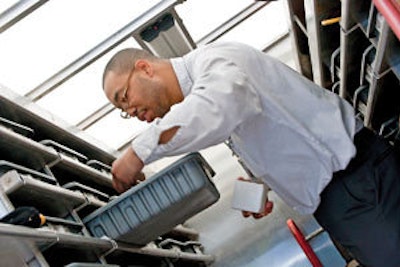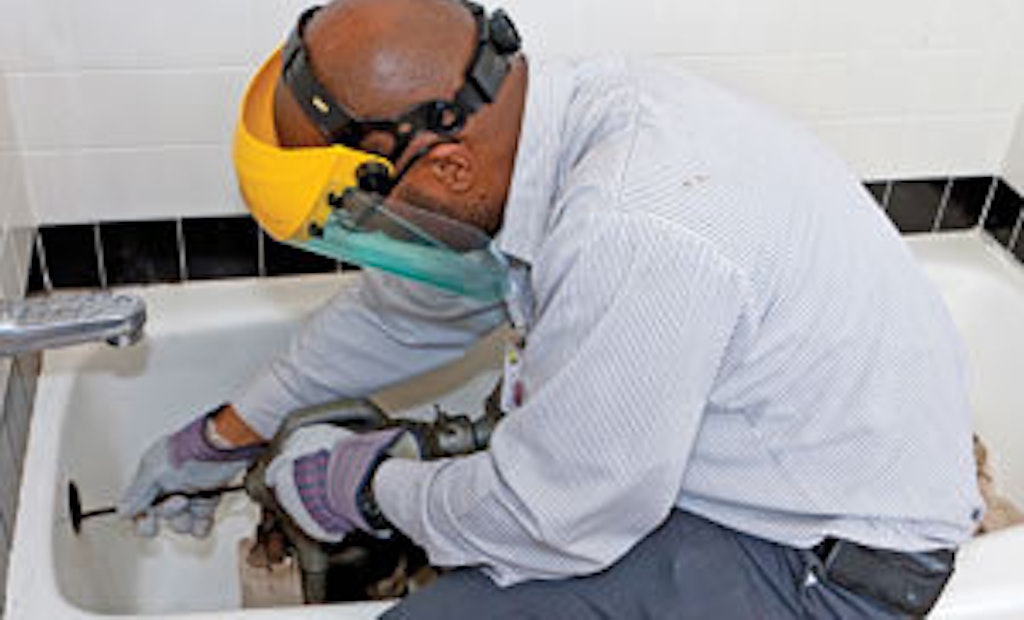Interested in Business?
Get Business articles, news and videos right in your inbox! Sign up now.
Business + Get AlertsAfter eight years as a residential drain cleaner and plumber in Washington, D.C., Frankey Grayton came to a realization: While Grayton Plumbing was profitable, his job satisfaction was running in the red.
“The average plumbing company is three trucks or smaller, and I had three trucks at the time,” Grayton says. “I was working a minimum of 60 hours and up to 75 hours a week. I wasn’t very happy. I thought that owning a business should be better than this.
“I didn’t know what I was doing. It became apparent that I was a heck of a master plumber, but a lousy businessman. Whether you run a barbershop, a restaurant or a bakery, there are lots of guys who know their craft, but not necessarily how to run a business. You have to work on your business. If you never work on your business, you’ll always work in your business.”
Today, Grayton runs six trucks – Dodge Sprinter 3500s with box bodies made by VT Hackney – and a spare cargo van. And thanks to innovative marketing practices, Grayton Plumbing enjoys great name recognition in the D.C. metro area.
Starting small
Grayton knew back in high school that he wanted to be a plumber. “I wanted to work outside, work on different projects and work with my hands,” he recalls. He apprenticed for two plumbing companies, then got laid off by the second in 1992, several years after completing his apprenticeship. That spurred him to strike out on his own.
“I printed up some business cards and started passing them out,” he says. “I started out with a decommissioned FedEx delivery truck, a RIDGID K-750 drum drain-cleaning machine, and a RIDGID K-50 sectional machine. By the time I got a callback from the place where I used to work, I was too busy to go back.”
In the early years, Grayton says, he was too naive to fear starting a company. He was 25 years old with a family to feed, and he had nothing to lose. “I owned a job – that’s how I like to put it,” he says. “Today I own a business. If I didn’t come to work back then, there was no business. Today, if I go away, the business keeps going.”
Important postcard
Things turned for the better after Grayton received a postcard solicitation from Plumbers’ Success International, a professional organization for independent contractors. Joining in 2000 jump-started the business.
“I went to a meeting and found answers to all the questions I ever had,” he recalls. “I learned things like how to make plumbers want to come to work for you, how to properly price jobs, how to write a Yellow Pages ad, and how to properly stock trucks. It was a revelation.
“I started attending PSI events every four months, and that led to combing the Internet and reading books for any information that could help me run my business more effectively. I doubled my revenue during my first year as a member, while still running the same three trucks. The biggest compliment I ever received was years later, when a sales rep asked me where I got my MBA degree. I told him I never went to college – just the school of hard knocks.”
Little by little
Change didn’t happen overnight: Improvements came incrementally as he started pricing jobs properly and profitably, taking his trucks to a body shop to have dings and dents removed, requiring technicians to wear uniforms instead of T-shirts and jeans, and changing the way staffers answered the phone.
Today, each Sprinter service van carries K-1500 and K-60 sectional drain-cleaning machines from RIDGID, or a K-50 sectional machine. Other RIDGID equipment includes a SeeSnake inspection camera, a Mini-SeeSnake camera, and KJ-1750 portable waterjetter for cleaning up to 4-inch pipes.
The marketing program includes cable TV ads, striking vinyl truck wraps that prominently feature Grayton’s picture on the back doors, and an attractive website.
“It wasn’t like we did it all at one time,” Grayton says. “We fixed one truck at a time and did just the minimum. We didn’t get the vinyl wraps until 2005 when I started buying new trucks. I did what I could afford. For instance, I went to a used-hubcap place and bought hubcaps, then bought a $3 can of spray paint to make them look right. It made the guys driving the trucks feel a little better about their trucks, too.
“It still took a good four years before I completely understood what I was doing and had things working well. After six years, we had one of our best years ever. We had things purring like a kitten after that.”
Marketing matters
Grayton has no formal training in marketing, but from PSI he learned a simple and valuable lesson: It’s good to be a contrarian. “I learned that if it looks like what everyone else is doing, you can’t expect it to stick out,” he says.
There are more than 300 registered plumbers in the D.C. area. “You’re fighting for mind-share,” he says. “So when it came to, say, a Yellow Pages ad, we wanted it to look different. When we designed a website, we wanted something unique. When it came to our trucks, we didn’t want something blasé.”
Phone book representatives always told Grayton that Yellow Pages ads should be full of pictures – that customers wouldn’t read a lot of verbiage. Grayton insisted on word-heavy ads and found that customers loved them. In fact, customers often comment about those ads.
“I built a marketing campaign around defying stereotypes,” Grayton says. “Our ads note that many plumbers don’t answer the phone, but we do. Many plumbers don’t show up with parts, but we do. Most plumbers don’t offer warranties, but we do. Or we talk about sticker shock: How some plumbers do work and give the customer a price after they’re done. We give you a price up front.”
Up the scale
As a bonus, Grayton discovered that by investing more in marketing, he attracted higher-level clientele. When he ran an ad the size of a business card, he got calls from customers who generally didn’t want to spend much money. When he ran full-page ads, he got more calls from people with higher disposable income.
“We started hitting neighborhoods we were never in before,” he says. “I remember one of my plumbers, a new employee, came back from a service call and said, ‘Where do you get these customers from? You tell them what’s wrong and how much it’ll cost to fix it, and they just agree.’ I told him that people respond to the marketing.
“If I own a Mercedes, would I let a budget shop work on it? No. I’m going to look for a really good mechanic. The same is true if you own a million-dollar home.”
New marketing avenues
Grayton is always looking for new ways to get his name in front of customers. When he found that local advocacy groups sponsor twice-a-year energy-efficiency trade shows, Grayton acted. He now joins local gas and electric company representatives to talk about things like energy-efficient boilers and tankless water heaters.
No matter what marketing avenues the company pursues, branding is consistent. “It’s not unusual for people to say they saw our cable TV ad, then saw one of our trucks the other day, and then found our Yellow Pages ad when they actually needed service,” Grayton says. “Sometimes it’s an accumulation of things that tip the balance. That’s why uniform branding is so important.”
Grayton also uses advertising to smooth out up-and-down business cycles. For example, if April is typically a slower period, he may boost advertising budgets as early as February, in outlets such as newspapers and direct mail.
Marketing plans also differentiate the company from competitors by promoting service warranties. Most service work carries a two-year warranty, and drain cleaning comes with a 30-day guarantee. The company monitors callback and warranty ratios to make sure service technicians “are dotting the ‘i’s’ and crossing the ‘t’s.’”
The company’s commitment to customer service is reflected in its slogan: Happy today, or you don’t pay. Grayton knows that satisfied customers generate referrals and repeat business. That keeps Grayton satisfied and happy – and makes him more than just a guy with three trucks.










